AudioCulture
The noisy library of New Zealand music
Te pātaka korihi o ngā puoro o Aotearoa
Flesh D-Vice
As the capital’s punk-heavy indie scene gathered strength and New Zealand’s punk rock community raised its head in the provinces the raw rocking quartet of Eugene Pope (guitar), Brent Jenkins (drums), Gerald Dwyer (vocals) and Richard Watts then Dwayne Yule (bass) remained active central figures, both live and on record.
In Gerald Dwyer, Flesh D-Vice not only had a distinctive and impassioned voice, the group had a highly capable organiser. With Riot 111’s Void, he organised and ran the Underground Emerges and Golden Showers multi-band punk one-nighters in 1983 as a response to the mainstream music festivals Sweetwaters and Brown Trout.
Flesh D-Vice were a frequent sight on New Zealand stages throughout the 1980s, touring widely and often.
Flesh D-Vice were a frequent sight on New Zealand stages throughout the 1980s, touring widely and often. Four strong Flesh D-Vice singles arrived that decade including highpoint ‘Flaming Soul’ along with three tough varied punk albums (12 Inches Of Hard Flesh, Some Blood Stained Morning, Secrets Of The Estranged). All available through Dwyer’s Jayrem Records-distributed punk label Hardedge Records.
Gerald Dwyer bowed out of Flesh D-Vice in 1991 leaving the rump trio of Pope, Yule and Jenkins to continue intermittently to the present day. The ever-busy Dwyer now ran Sticky Fingers poster and flyer campaigns in Wellington to keep him active as he helped to establish two of the city’s best groups, Shihad and Head Like A Hole as New Zealand heavy rock titans, before his sudden death in early 1996.
Hard edge city
The polarised New Zealand punk scene that Flesh D-Vice entered in late 1982 and 1983 was a movement split between cities and punks and skins as well as between allegiances to various musical strands of the sound. Live shows often descended into violence or were closed down early through police harassment. You never knew how the evening would end.
The harder the edge, the rocker the roll, that’s what Gerald Dwyer would later name one of his gatherings of songs from New Zealand’s scattered 1980s punk community, in doing so concisely summing up the possibilities the fraught air of the 1980s allowed.
The new faces and fresh fault lines were all there on display on April 2, 1983 at the Golden Showers punk festival in Newtown Community Centre on the corner of Columbo and Rintoul Streets in Wellington. “Sick of Sweetwaters? Bored by Brown Trout? ALL OUT!!! New Zealand Punks, Skins and Ragers for a new wave punk celebration pissing over the others! Let there be noise…” a half page ad in Rip It Up extolled. Eight dollars got you in the door.
Flesh D-Vice were just one the new crop of New Zealand punk bands that night sharing the stage with Desperate Measures and The Johnnies from Christchurch and Wellington’s Riot 111, Unrestful Movements, Aftershock and Suspect Device. There was tension in the evening air as Auckland and Wellington punks and skins clashed, but the evening’s bill all still got to play and the organisers recouped costs.
The landmark event would soon spawn Capital Kaos, the first substantial New Zealand punk compilation album since AK79, to which Flesh D-Vice would contribute ‘Dead Girlss’ and ‘Fuck Off Embarrassment.’
“The support in Wellington is just growing every week,” Gerald Dwyer told Rip It Up in late 1983. “There are underground bands starting all the time. Apart from bands like Flesh D-Vice, there are new bands like Destructive Adolescents and Suicide Pact. It’s [punk rock] so big in Britain right now. It’s just that its not at the forefront of the media anymore.”
The early Flesh D-Vice (the name being a compromise between bass player Richard Watts’ preference The Flesh Angels and Dwyer’s Suspect Device) stepped out at Charlie’s Strip Club and at the two additional punk festivals organised by Dwyer and Void. On a bill with Nelson’s Boner, Levin’s No Idea, the capital’s Destructive Adolescents and Aftershock in Wellington’s Rock Theatre on Saturday October 22, 1983 music magazine TOM found Flesh D-Vice amidst the new crop of rising punk groups.
“Flesh D-Vice have a sense of humour, movement and entertainment. The band is not about violence at all,” writer Steven Braunias observed. “At their best, passages were exhilarating, tearing off shreds of electricity and stomp causing bodies to be flung across the dance-floor in the friendliest way.
“Their swaggering guitarist – who has a huge grinning face that looks like a fish dipped in whisky – and vocalist Dwyer are especially energetic obviously wanting everyone to have a good time. At one point Dwyer took his mike onto the floor, got involved in a four-way grapple and kept singing: almost corny, really, but effective.”
Flesh D-Vice’s first album 12” Of Hard Flesh arrived in early 1984.
Flesh D-Vice’s first album 12” Of Hard Flesh arrived in early 1984. Neil Cartwright, whose specialist Campus Radio slot The Resurrection Punk Show was appointment listening for fans of furious rock, heard an album with “seven songs ranging from the throat grabbing approach of ‘Kill That Girl’ to more straight forward rockers like ‘Baby Of My Mind,’ ‘Friday Nights’ and ‘War Boots’.
“Here lies one of my reservations. ‘War Boots’ is dumb and as one member of this band has been the victim of mindless violence they should know better. The other complaint is that it is just too basic. The band are underplaying themselves [and] only really showcasing their abilities on the brilliant ‘Desolation Dogs.’”
With punk sparking in Christchurch, Flesh D-Vice headed south for three nights at the Star and Garter on December 21, 22, and 23, shifting venue to the city’s DB Gladstone the following night.
Summertime blues
A second Flesh D-Vice album wasn’t long in arriving. In early 1985, the Wellington punks’ released Some Blood Stained Morning (catalogue number HELL 4U). Recorded at Wellington’s Broadcasting House with Tony Burns in March 1984 and mixed the following month, the 10-song album is a varied and challenging work.
“If you’ve any doubts just listen to the snappy ‘Colour Me Wrong’, a tale of trying to escape from things – and failing – then the Ramones-ish hard pop of ‘Hamburger’ with its humour and horror fun lyrics, the high speed ‘Bullet,’ the wonderfully evil ‘Billy Shakes,’ which treads Birthday Party territory, or the hit ‘Invisible Man,’ a song I just can’t stand still to. Listen, I play this record every day,” Neil Cartwright enthused in Rip It Up. A video was made for ‘Invisible Man,’ a song whose title further exposed Dwyer’s love of classic horrors and thrillers.
On October 31, 1985 Flesh D-Vice grabbed rising trio The Glass for what would become a regular Halloween outing for the band, this time at Wellington’s Terminus, aided by smoke machines and dripping pig’s heads over the stage.
They had ‘Flaming Soul,’ one of their best-realised songs out as a single that year, backed with ‘Coolin Down’ and ‘F.O.E (Mix)’. A memorable video was filmed of ‘Flaming Soul’.
Flesh D-Vice’s Summertime Blues Tour of ’85 traversed both islands selling out Dunedin’s Empire before heading north for an end of November weekend at Auckland’s Windsor Castle. Another Queen City show on the first day of December was chased by dates in Napier and two nights, including Friday the 13th at Wellington’s Terminus.
The album ‘Flaming Soul’ was plucked from, Secrets Of The Estanged (engineered by Neil Maddever and produced by Tony Burns at Broadcasting House studio 2) was in stores in late 1985, housed in an elaborate and memorable sleeve from Jane Walker of Toy Love.
Reviews were again favourable. Rip It Up’s Matthew Hyland pointed to the record’s variety. “The album is guitar dominated, while the lyrics contain a lot of bitterness and a large dose of black humour – tales of joy soured by reality. Vivid musical images are created by a mixture of contrast and harmony with the lyrics helping to emphasis the bitterness.”
Hyland heard ‘Flaming Soul’ as a blend of distorted rock n roll with the band’s own brand of raucous anguish. ‘Strange Television’ plus the slower jagged ‘Science Fiction’ were praised as was the US Hardcore influenced ‘Insanity Zone’ along with ‘Into The Heart of Pain’ and ‘Jelly Babies.’
“[Flesh D-Vice] are one of New Zealand’s top punk bands, capable of experimenting without being bound by the expectations of experimental music,” he concluded.
The group’s first major interview appeared in April 1986’s Rip It Up as Hard Edge City. In the revealing piece, Gerald Dwyer intelligently addresses issues around the group’s audience, sound and place in the wider music scene of the time.
“All kinds of people come to our gigs, not just a certain kind, the boots or skins. And that’s really good. Because I don’t think we’re just a punk band. I call what we do ‘hard edge rock n roll, because that what it is. It’s music to have a good time to,” he said.
Dwyer also admits that some current punks, particularly those in Christchurch, dislike Flesh D-Vice because they don’t get the ideology, but he doesn’t mind that. “Actually there is an ideology, albeit a romantic one, in Dwyer’s words live-fast-stay-free rock n roll lyrics, one that tallies with the music more [than] any strained politicising would,” writer Russell Brown added.
Asked about a reference from ‘Flaming Soul’s back cover to ‘This Is Flying None country – we don’t have no rock n roll here’ that was affixed to a photo of rednecks with guns, Gerald Dwyer explained that the provocative quote and image were a reaction to being turned down for a booking at Dunedin’s Oriental Tavern because only Flying Nun bands succeeded there. Flesh D-Vice played the Empire Tavern instead and sold out both nights.
Musical changes within the group were now more than obvious.
Musical changes within the group were now more than obvious. Drummer Brent Jenkins was into English punk and Dwyer into American Hardcore, while ‘Flaming Soul’ was a different kind of rock again.
“As we were finishing the album,” Dwyer explained, “Eugene, our guitarist, looked at me and said, ‘Well, this is the end of an era,’ and it’s true. Our next recording will be very different.”
Following a national tour in March, Flesh D-Vice celebrated 1986’s All Saints Eve in late October and early November at Wellington’s Clyde Quay with Auckland punks Morning Horn as Halloween: A Blast From The Past.
Political cartoonist Trace Hodgson recalled a Flesh D-Vice show at Clyde Quay’s The Pulse in an interview with guitarist Eugene Pope for Rip It Up in August/ September 2003.
“Low ceiling, minimal lighting. I walked into a dark and fiery set just as they were about to shift into a state of sonic resonance to spur on an enraptured audience. The Police riot quad marched in surrounding the dance floor and dragged away anyone who looked remotely underage. That meant more or less the whole crowd. The band played defiantly on, but the gig was over.”
Hell and damnation
With three albums and two hard rocking singles under their studded belts and with a presence on music television and a reputation as a group good for a wild night out secured, Flesh D-Vice loaded the van once more.
The Short Stop and Rapid Fire tour of December 1986 took the punk band to New Plymouth’s Bellblock to see in the New Year. Then it was north to Auckland’s Gluepot for two nights in early January, bookended by two more nights at Wellington’s Cricketers.
A live take of ‘Strange TV’ from Flesh D-Vice’s October 1985 Halloween show became the B-side to their version of Joy Division’s ‘Transmission’ (recorded in April 1985, but not released as a single until mid-1987). It seemed a strange choice of cover at the time for a punk band, but is more understandable in the light of the Joy Division influenced group Eugene Pope was in before Flesh D-Vice.
‘Transmission’ wasn’t the only punk-related release in mid-1987. The Out Of Order EP had Defiance (Auckland), Acid Reign, Nazgul (Wellington), Holocaust (Christchurch) and The Mindfuckers (Dunedin) on it. August produced Sticky Filth’s At Least Rock N Roll Doesn’t Give You Aids single, Number Nine’s Nowhere Fast LP and the Dwyer compiled punk collection The Harder The Edge... The Rocka The Roll, featuring Levin’s No Idea, Wellington’s Compos Mentis, Napier’s Five Year Mission and Flesh D-Vice (with new songs’ ‘Sex Metal’ and ‘Shifting Night’) onboard, among others. Regional punk fanzines were also prevalent indicating a robust and active music community.
October 1987 saw Flesh D-Vice embark on the Hell and Damnation tour with The Sun-Dominants in support. Late that month they were at Albert Motor Inn in Palmerston North before shifting to New Plymouth’s White Hart then Auckland’s Gluepot for the group’s annual Halloween outing. Come early November and Flesh D-Vice were back in Wellington at The Cricketers before joining the best of the busy capital city indie scene at the Railways Hall.
1988 was a quiet year for the group with only the Andy Drey and Brent McLachlan produced Hamburger II: The nite she returned 12” EP appearing mid-year with a version of Led Zeppelin’s ‘When The Levee Breaks’ on the flipside, and the return of ‘Legend of Lugosi’ on the Ima Hitt Records compilation Celebrate The Sonic Arts.
Savage Truth
There were no new records at all for Flesh D-Vice in 1989. The most notable event for the group was the Savage Truth tour of late April and early May that took in Superliquorman in Palmerston North, Westown in New Plymouth, Gurus at University of Waikato and Auckland’s Rising Sun, before returning to Wellington’s Clarendon on November 4.
A new Flesh D-Vice record, All My Sins (Remembered), a red vinyl 10” on Spizz Records, arrived in 1990 and was celebrated with a show at Wellington’s Rocky’s before Gerald Dwyer called it quits on his participation in the band in 1991. Typically he stopped cold. “It was time to move on, next project,” his friend Ania Glowacz later put it. The punk scene mover was now free to manage the up and coming hard rock band, Shihad, and later Head Like a Hole, and run his poster distribution business.
Two more Flesh D-Vice records were unleashed in 1992: a six-song live bootleg taped in Palmerston North and Wellington between 1988 and 1991 and the ‘Spoilers’ single, both on Spizz Records.
The rump trio of Pope, Jenkins and Yule would carry on as they did at New Plymouth’s Mushroom Ball in Section VIII on Friday the thirteenth of May 1994 with Vas Deferens’ Steve Andrews replacing Gerald Dwyer upfront. Flesh D-Vice followed the show with a return appearance in July at Section VIII with Wretched Skinny and at Auckland’s Squid Bar.
In the meantime, Gerald Dwyer was keeping busy helping to promote Shihad’s Churn (1993) and Killjoy (1995) albums and touring.
In the meantime, Gerald Dwyer was keeping busy helping to promote Shihad’s Churn (1993) and Killjoy (1995) albums and touring the group through Australia twice in 1993, through Germany, Austria and Holland in 1994 and England, Europe and the United States in 1995.
Shihad weren’t long back from America when they fronted up at Auckland’s Big Day Out on January 19, 1996. After dropping Shihad off at the festival site, Gerald Dwyer left at 7.30pm to visit two old friends in the city. His girlfriend returned to their Grey Lynn motel room at about midnight and found him.
Dwyer, one of the most respected men in the music industry died that evening of a morphine overdose. He was known to have experimented with drugs, the inquest heard. Members of Shihad had once joked he was way more of a rock n roll animal than any of the band.
At only thirty-five, it was a tragic loss. Shihad drummer Tom Larkin recalled Gerald Dwyer approaching them early on and telling the group he knew what they wanted and how to get it.
“It was basically that Gerald understood the music, he wasn’t a business manager looking to make money. He’d probably want to be remembered for his tours. He got a big thrill out of those especially the overseas ones. He always wanted to get Flesh D-Vice overseas but never managed to,” said Larkin.
Shihad recorded and released a single of ‘Flaming Soul’ in Dwyer’s honour.
Real Groove ran a eulogy from Dwyer’s friend and Wellington 1980’s fanzine editor Ania Glowacz, which celebrated him as “a mentor, co-conspirator and major inspiration. A constant reminder of how to direct not divert creative energy and not rest on your imagined laurels waiting for the world to happen for you.”
Flaming Soul
Flesh D-Vice went their separate ways in 1998. Eugene Pope and Dwayne Yule crossed paths and shared bands in Great Britain and Europe while Brent Jenkins drummed in Gobsmackt and Good Old Boys. Just back from stage managing groups in London and with a Flesh D-Vice retrospective on Jayrem Records to promote, Eugene Pope sat down with Trace Hodgson in 2003 to look back on the band’s life:
“We’ve been going over twenty years now and we’re not going to disappear tomorrow. We’ve played with just about every hardcore act in this country – The Warners, No Tag, Sticky Filth, Stormbringer and Tyrant right on though to School of Meat,” Pope said.
“Every gig we played in the old days was marred by violence. But now it’s sweet. The longer drinking hours have changed the music scene a lot. You can get a whole line-up of bands on the same night and still be partying in the morning.”
When Wellington’s Up The Punks project and website gathered up the city’s oldies for a reunion in early October 2010, Flesh D-Vice were there. They were back again for the site’s New Wave Spacktacular at Thistle Hall on November 10, 2012.
Vas Deferens vocalist and sometime Flesh D-Vice singer Steve Andrews died in December 2012 after a fight outside a South-West London pub.
The core Flesh D-Vice trio played out as recently as 2014 at shows with a reformed Vas Deferens in May in New Plymouth and Wellington.
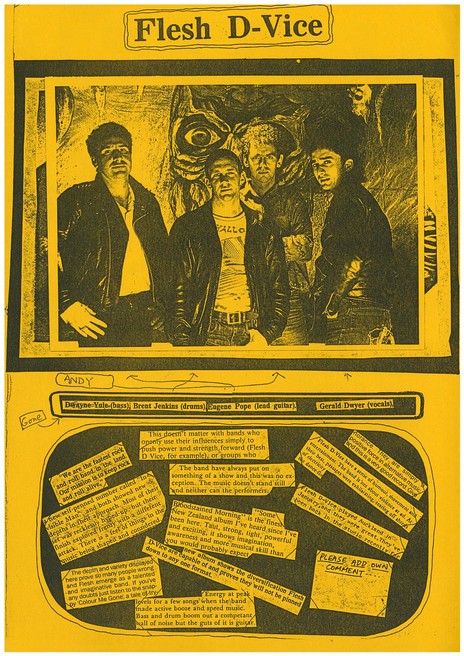
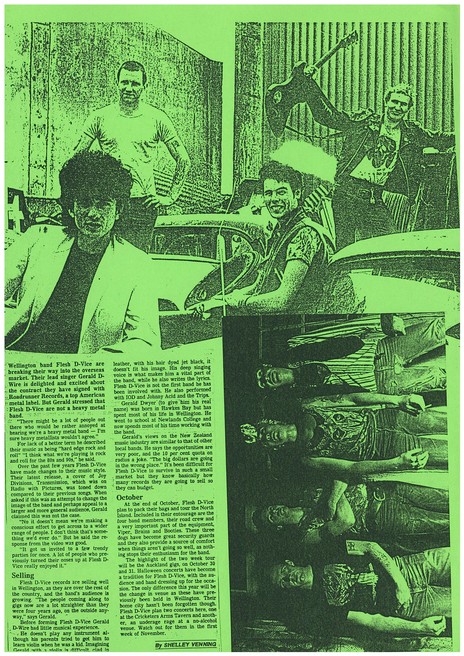
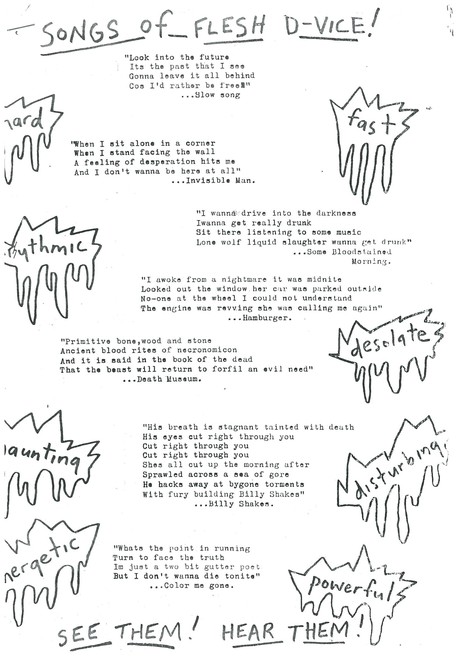
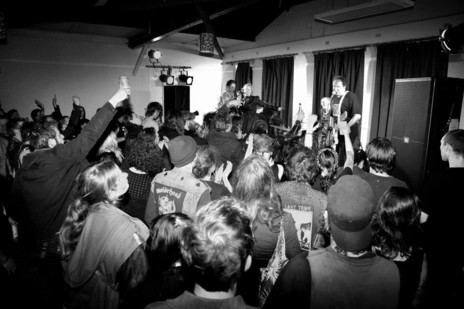
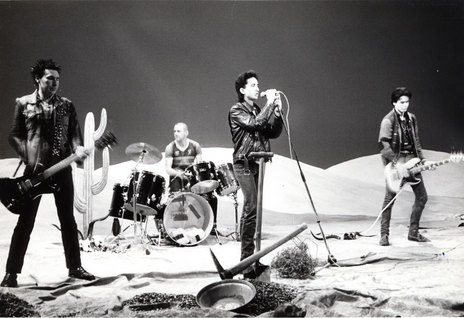
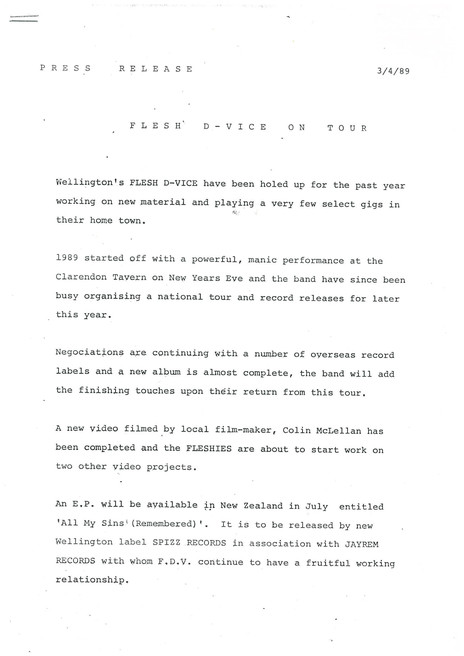
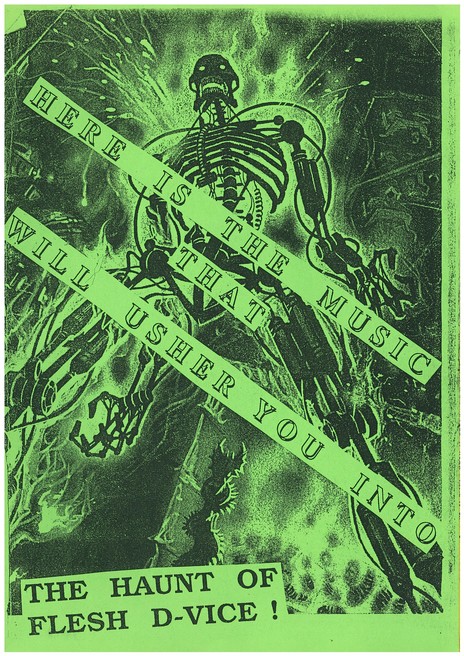
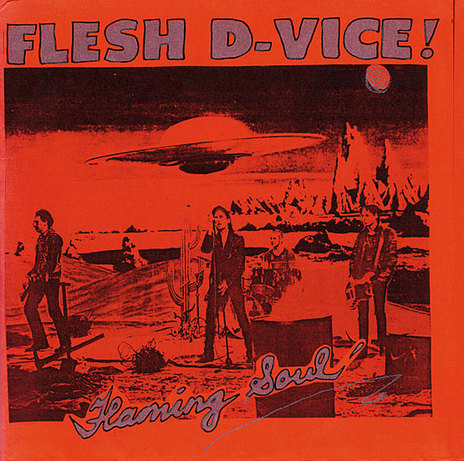
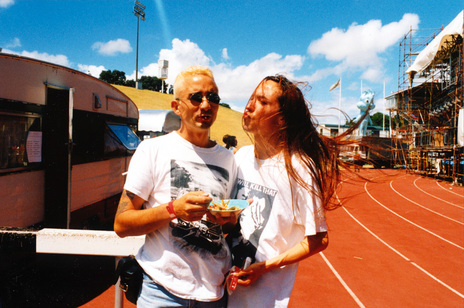
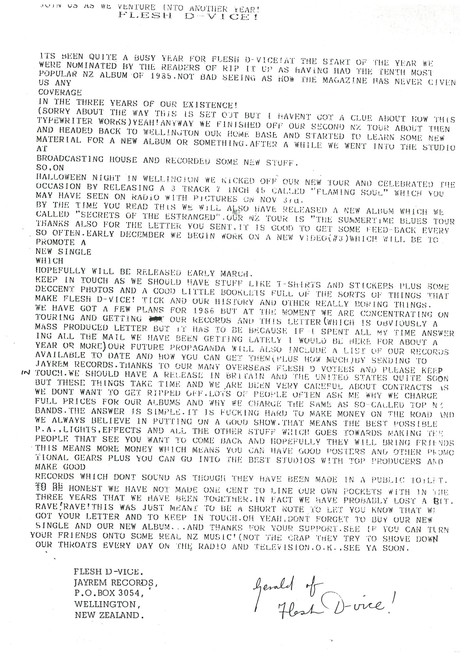
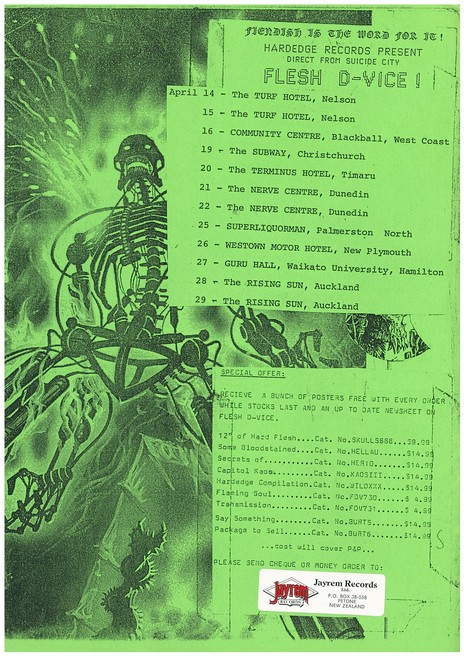
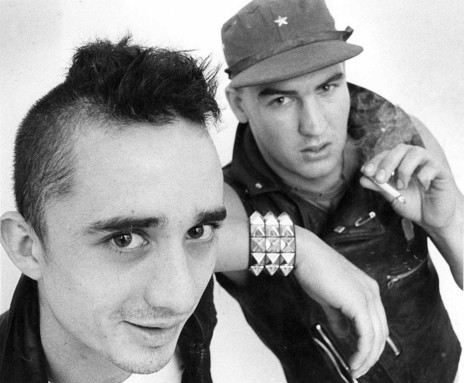
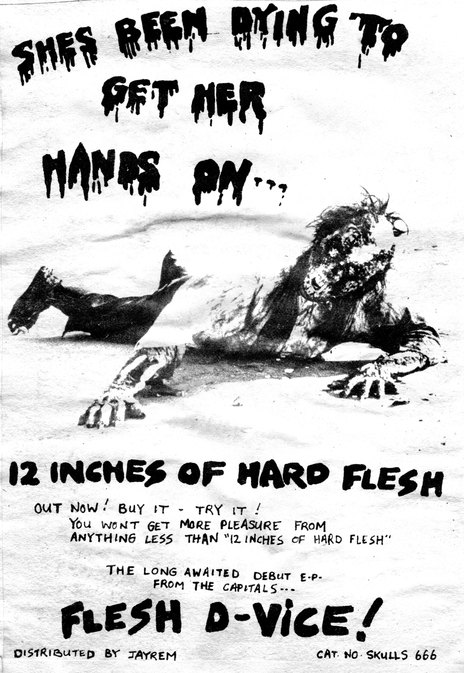
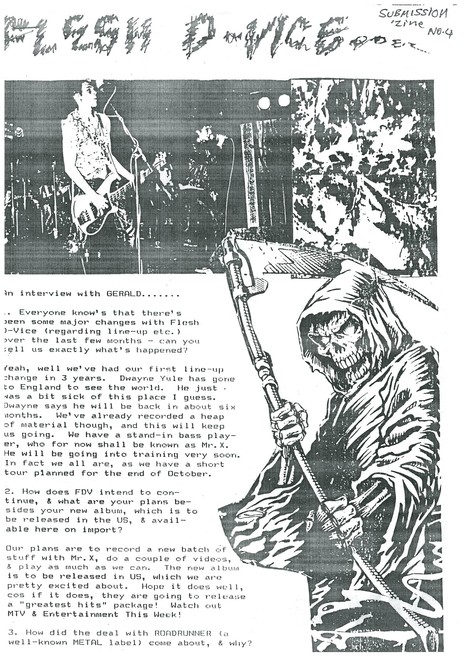
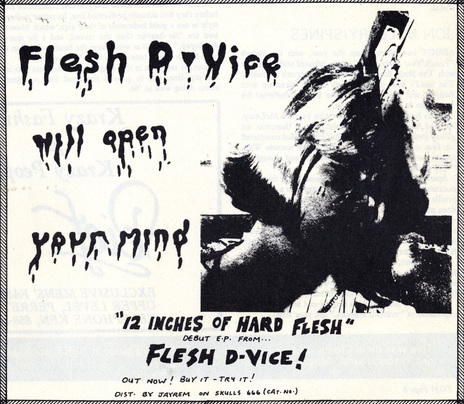
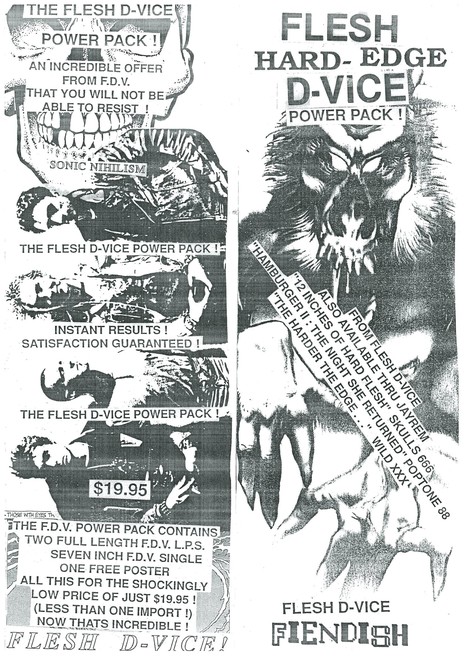
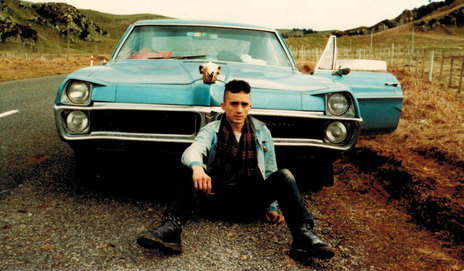
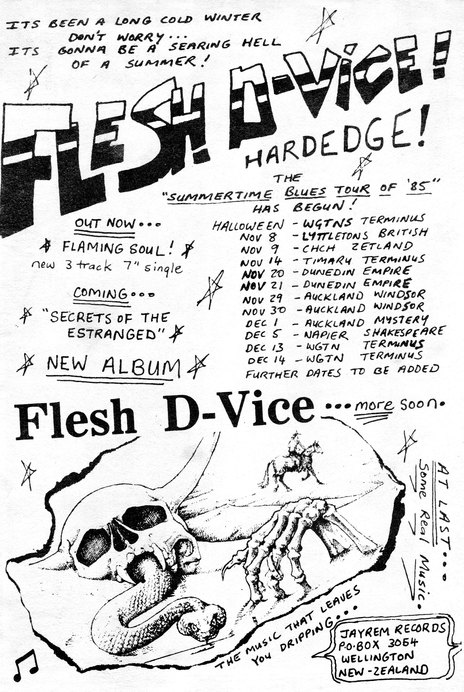
Gerald Dwyer - vocals
Eugene Pope - guitar
Richard Watts - bass
Dwayne Yule - bass
Brent Jenkins - drums
Steve Andrews - vocals
Gerald Dwyer was manager for Wellington rock groups Head Like A Hole and Shihad. Shihad released a cover of Flesh D-Vice’s Flaming Soul as a tribute to Dwyer in 1997.
Visit our sister site
NZ On ScreenMade with funding from
NZ On Air
